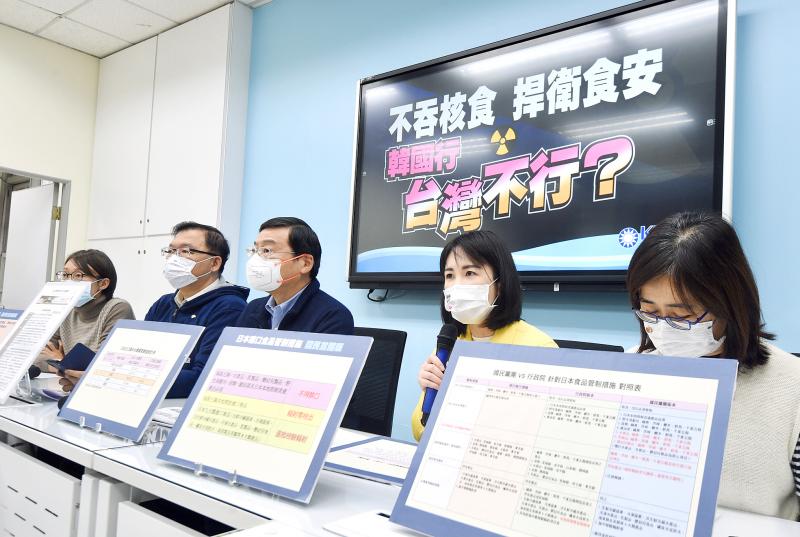The Chinese Nationalist Party (KMT) caucus yesterday called on the government to be more restrictive regarding the types of food that can be imported from Japan’s Fukushima and surrounding prefectures once an import ban is lifted.
The Executive Yuan on Tuesday last week said that Taiwan would soon allow the importation of food products that had been banned following the 2011 Fukushima Dai-ichi nuclear power plant disaster.
Foods imported from the five prefectures would need certificates of origin and radiation inspection certificates, while imports of mushrooms, meat from wild animals and hill potherbs from the prefectures would still be banned, it said.

Photo: Peter Lo, Taipei Times
The caucus yesterday said that it hoped the Democratic Progressive Party (DPP) government would continue to ban imports of seafood, dairy and baby food from the five prefectures, citing similar restrictions in South Korea.
Taiwan is the third-largest importer of Japanese food, which gives it the right to be stricter, KMT caucus whip William Tseng (曾銘宗) told a news conference at the Legislative Yuan in Taipei.
“Taiwanese are not convinced by the Executive Yuan’s ‘three measures and principles’ on lifting the import ban,” KMT Legislator Hsieh Yi-fong said. “There should also be a requirement that imported food products have zero radiation.”
The KMT had made several proposals to the administration, including sending experts to Japan to inspect local radiation levels, requiring batch-by-batch food inspections in nine categories, testing foods for the presence of cesium-137 and strontium-90, and subsidizing the purchase of radiation testing equipment for all local governments, KMT Legislator Wu I-ding (吳怡玎) said.
“Although the amount of food that enters Taiwanese campuses from those prefectures is relatively low, the potential for it entering school meals should not be ignored,” KMT Legislator Lin Yi-hua (林奕華) said, adding that the School Health Act (學校衛生法) should be amended to restrict the use of imported foods from the five prefectures in school meals.
The KMT had been introducing local ordinances on the issue, but was told by the administration not to create conflicts with the national legislation, KMT Legislator Lee De-wei (李德維) said.
However, Constitutional Interpretation No. 738 stipulates that the spirit of local self-governance must be protected in accordance with local conditions and in the public interest, he said.
Tseng criticized calls by DPP caucus whip Ker Chien-ming (柯建銘) for the KMT to unite with the DPP over the food imports, to assist in Taiwan joining the Comprehensive and Progressive Agreement for Trans-Pacific Partnership (CPTPP).
“Should the public’s rights be sacrificed for the purpose of joining the CPTPP?” he asked.
Accepting food imports from the five prefectures should not be a requirement for joining the trade pact, he said, citing Singapore’s two-year delay between joining the CPTPP and accepting certain import items.

Palauan President Surangel Whipps Jr arrived in Taiwan last night to kick off his first visit to the country since beginning his second term earlier this year. After arriving at Taoyuan International Airport at around 6:30 pm, Whipps and his delegation were welcomed by Minister of Foreign Affairs Lin Chia-lung (林佳龍). Speaking to gathered media, the Palauan leader said he was excited and honored to be back in Taiwan on his first state visit to Taiwan since he was sworn in this January. Among those traveling with Whipps is Minister of State Gustav N. Aitaro, Public Infrastructure

RESOLUTIONS DEBATE: Taiwan’s allies said that UN and WHA resolutions cited by China and other nations ‘do not determine Taiwan’s participation in WHO activities’ A proposal to invite Taiwan to this year’s World Health Assembly (WHA) was rejected on Monday, resulting in Taipei’s absence from the annual meeting for a ninth consecutive year, although partners spoke up for Taiwan’s participation at the first day of the meeting. The first agenda item after the opening was a “two-on-two debate” on a proposal to invite Taiwan to participate at the WHA as an observer. Similar to previous years, two countries made statements in favor of the proposal, while two others expressed their opposition. Philippine Secretary of Health Teodoro Herbosa, president of the 78th WHA, accepted the WHA General Committee’s

Premier Cho Jung-tai (卓榮泰) on Friday laid out the Cabinet’s updated policy agenda and recapped the government’s achievements ahead of the one-year anniversary of President William Lai’s (賴清德) inauguration. Cho said the government had made progress across a range of areas, including rebuilding Hualien, cracking down on fraud, improving pedestrian safety and promoting economic growth. “I hope the public will not have the impression that the Cabinet only asked the legislature to reconsider a bunch of legal amendments,” Cho said, calling the moves “necessary” to protect constitutional governance and the public’s interest. The Cabinet would work toward achieving its “1+7” plan, he said. The

Nvidia founder and CEO Jensen Huang (黃仁勳) hosted a dinner in Taipei last night with key Taiwanese suppliers to celebrate the successful mass production of the company’s new Blackwell AI systems. Speaking to the media earlier yesterday, Huang thanked Nvidia’s Taiwanese partners for their contributions to the company’s ecosystem, while also sharing his plans to meet with Taiwan Semiconductor Manufacturing Co (TSMC) founder Morris Chang (張忠謀). In response to rumors that Nvidia will launch a downgraded Hopper H20 chip for China in July, Huang dismissed the reports, saying, “That is not true.” He clarified that there